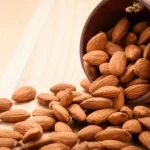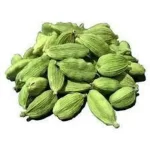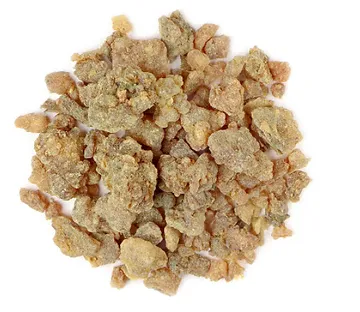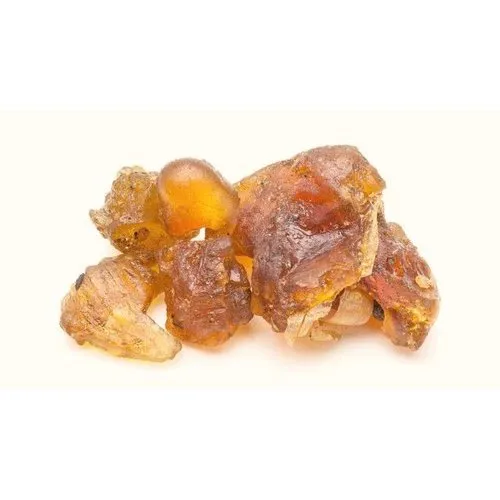A relative of the African myrrh tree, guggul is a soft, golden brown myrrh gum resin. An exudation from a small scrubby tree or shrub that's found in the central regions of India, it's less bitter in aroma than the hard bisabol type myrrhs from Africa and Arabia.
Guggul has a warm, slightly sweet, balsamic, herbaceous, and earthy aroma with hints of vanilla. It's our preferred myrrh-type resin for many of our own incense mixtures. Well known and widely used in Ayurvedic medicine, guggul or "common myrrh" is said to rejuvenate the spirit, increase one's energy and provide an overall feeling of well being. It purifies the air and cleanses the body. It's used as incense in India in the evening to relax before retiring.
Guggul is praised for its anti-inflammatory properties.
Preliminary research suggests it may help treat certain anti-inflammatory conditions, such as acne, eczema, psoriasis, and arthritis.
It has also been used to promote weight loss, treat hypothyroidism, and manage cholesterol and blood sugar levels.
However, clinical studies supporting all of these benefits and uses are generally limited. Here’s what research says about these claims.
Acne
Guggul has been studied for its potential to treat acne. It has been shown to be effective in both complementary and alternative treatments for nodulocystic acne, a severe form of acne affecting the face, chest, and back .
Another older study found that taking guggul orally for 6 weeks helped treat acne without causing any major adverse effects.
Although the results from these studies seem promising, more up-to-date research is warranted before strong conclusions can be made.
Eczema, psoriasis, and skin irritation
Eczema and psoriasis are both noncontagious skin conditions that are mainly caused by inflammation of the skin.
Most of the research on guggul’s ability to treat these and other skin irritations has investigated the effects of guggul extracted from the Boswellia serrata plant.
Guggul-based creams have been shown to improve itchiness, redness or skin discoloration, and inflammation in people with psoriasis and eczema.
A recent study also found that a guggul-based cream treated skin reactions that occurred as a side effect of radiotherapy treatment for breast cancer.
It found that the guggul-based cream improved skin symptoms, such as redness, inflammation, tenderness, and pain, as well as reduced the need for topical steroid creams for treatment.
Still, research is limited, and more studies are needed to confirm guggul’s purported benefits for skin health.
Hypothyroidism
Thyroid disorders are relatively common, especially among women.
Hypothyroidism is a condition in which your thyroid gland doesn’t make enough thyroid hormones to keep your body running normally.
Animal studies, some of which are dated, suggest that guggul extracts improve hypothyroidism by increasing iodine uptake and improving the activity of enzymes produced by the thyroid gland.
Weight loss
Guggul is often claimed to help treat obesity by promoting fat loss and suppressing appetite. However, very little high quality evidence exists to support its use for this purpose.
Additional studies have shown that herbal supplements containing guggul extract may help treat obesity by promoting weight loss and reducing both skinfold thickness and body circumference.
Although the results of these studies seem promising, they don’t examine the effects of guggul specifically on weight loss.
Ultimately, further research is warranted to confirm the link between guggul and weight loss.
Hyperlipidemia
Guggul is a popular natural treatment for hyperlipidemia, which is the medical term for abnormally high cholesterol and triglycerides levels.
Nevertheless, more research is needed to understand the effect of guggul on cholesterol levels in humans.
Osteoarthritis
Early research suggests guggul may alleviate symptoms associated with osteoarthritis.
One older study in 30 people with knee osteoarthritis who were treated with guggul showed improvements in knee pain and knee swelling, as well as increased knee flexion.
Diabetes
You may come across claims online about guggul’s purported ability to lower blood sugar and manage diabetes.
However, recent evidence is lacking, and much of the research on guggul and its effect on blood sugar levels was conducted in animals.
Additionally, one recent double-blind, placebo-controlled study found guggul statistically ineffective at lowering blood sugar levels in people with type 2 diabetes.
More research is needed to determine what effect, if any, guggul has on blood sugar control in humans.
Disclaimer: All benefits and uses warrants further research and studies to verify the benefits of Gum Guggul.
Al Nama Herbals General Trading LLC
info@alnamaherbals.com
www.alnamaherbals.com
132 Al Ras, Deira, UAE
+971 50 462 0396





